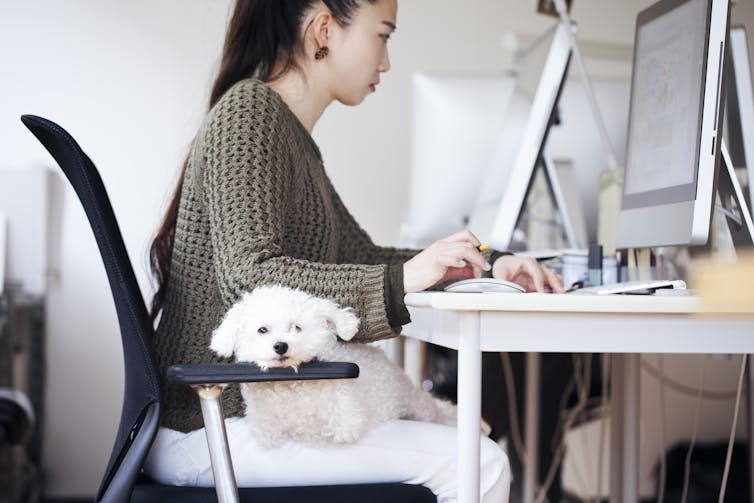Very good dogs don't necessarily make very good co-workers
- Written by Jessica Myrick, Associate Professor of Media Studies, Pennsylvania State University
Because of the COVID-19 pandemic, many of us are working from home in close proximity to our human children or fur babies.
Cats have their fans, but I want to focus on dogs.
Dogs are great companions. Science suggests owning one may benefit mental health[1]. Just making eye contact with your dog can release the feel-good hormone oxytocin[2].
But, as a researcher who studies emotions, procrastination and how people interact with pets[3], I can tell you that sometimes work emphasizes getting things done over feel-good chemicals. So what do we know about how this new-found time with your dog might be affecting your productivity?
Good dog, bad dog
There’s evidence[4] that bringing your dog to work with you can reduce your perceived stress levels as the day progresses. And research on stress management[5] has shown that employees who feel good are more productive.
Taken together, those findings bode well for including your canine companions in your at-home work routines.
Keep in mind, pets can get stressed when their surroundings or routines change[6], and it may take a while for both you and your pup to settle into a new working-with-your-dog lifestyle.
 Sometimes the best co-workers have four legs and a tail.
Maskot/Getty Images[7]
Sometimes the best co-workers have four legs and a tail.
Maskot/Getty Images[7]
Working with pet videos
If you don’t have a pet but want to benefit from the same potential boosts in mood or productivity, there is always the internet.
In a cross-sectional survey I conducted with 7,000 internet users[8] in 2015, I found that watching cat videos can give people a quick boost of happiness and energy. While this study focused on felines, dog lovers may get similar benefits from watching videos of their favorite pooches.
A study of veterinary students[9] tested this idea. The course instructor picked 20 class days and on half showed a cute or funny video featuring dogs or cats during the middle of the lecture.
Students were surveyed during all 20 class days. On the days they viewed animal videos they reported more positive mood, greater interest in the course material and deeper understanding of the course material.
While you are not going to get a lot of work done watching hours of pet videos on YouTube, some research suggests that taking short breaks for a mood-boosting activity, be it petting an actual dog[10] or watching a video of one online[11], may not only improve your mood but also decrease stress or re-energize you when you do return to your work.
 While Mom works hard, Fido is hardly working.
Kohei Hara/Getty Images[12]
While Mom works hard, Fido is hardly working.
Kohei Hara/Getty Images[12]
Finding a solution
More studies are needed in this area to come to a stronger scientific consensus on the relationship between working alongside your dog and your productivity.
The value of having a dog with you during your workday will depend on the type of work, the workplace or work-from-home environment, the type of dog and your own style of work.
In the meantime, pick up your dog for a minute so all your co-workers can make eye contact with her via the group Zoom video session and share in your oxytocin boost[13].
[Like what you’ve read? Want more? Sign up for The Conversation’s daily newsletter[14].]
References
- ^ owning one may benefit mental health (www.tandfonline.com)
- ^ making eye contact with your dog can release the feel-good hormone oxytocin (science.sciencemag.org)
- ^ studies emotions, procrastination and how people interact with pets (pennstate.academia.edu)
- ^ There’s evidence (www.emerald.com)
- ^ research on stress management (psycnet.apa.org)
- ^ pets can get stressed when their surroundings or routines change (theconversation.com)
- ^ Maskot/Getty Images (www.gettyimages.com)
- ^ survey I conducted with 7,000 internet users (www.sciencedirect.com)
- ^ A study of veterinary students (jvme.utpjournals.press)
- ^ petting an actual dog (www.tandfonline.com)
- ^ watching a video of one online (www.sciencedirect.com)
- ^ Kohei Hara/Getty Images (www.gettyimages.com)
- ^ oxytocin boost (www.psychologytoday.com)
- ^ Sign up for The Conversation’s daily newsletter (theconversation.com)
Authors: Jessica Myrick, Associate Professor of Media Studies, Pennsylvania State University
Read more https://theconversation.com/very-good-dogs-dont-necessarily-make-very-good-co-workers-135922

